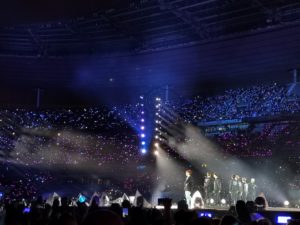Over the last decade, South Korean pop music — or “K-pop” — has gone mainstream around the world, especially here in the United States.
Experts and fans say K-pop music and its fans are starting to have an impact on American society — and even on Americans who have never heard a K-pop song.
BTS, for one, has a reputation for singing and rapping about injustices in South Korean society. Their lyrics address taboo topics such as mental health, the demanding education system, and other issues that affect young people.
Fans in the U.S. — even those who don’t speak Korean — have taken cues from their favorite K-pop stars, and are turning to activism themselves.
Variety reported that last year, during the George Floyd protests, several K-pop artists donated to the Black Lives Matter fund — including BTS. Within a day, their fans had matched the donation.

(Photo courtesy of Louise Järsberg)
“We were a part of a project called MatchAMillion, which was when BTS donated 1-million dollars for Black Lives Matter, the fans were like, ‘We should match this.’” said Louise Järsberg, an organizer for a charity called One in an ARMY. (The charity’s name references the moniker some BTS fans have adopted: “ARMY,” which standards for “Adorable Representative M.C. for Youth.”)
“Then two Twitter users came,” Järsberg added, “and said we should do a hashtag and someone said what about MatchAMillion? … So they reached out to us,”
The BBC reported that ARMYs and other K-pop fans on social media flooded hashtags like #Alllivesmatter and #Bluelivesmatter last year with videos of their favorite idols — crowding out the voices of Black Lives Matter opponents.
The New York Times reported that K-pop fans even claimed credit for reserving the majority of the tickets to an indoor rally where former president Donald Trump was set to speak last summer.
Academics and ardent supporters recently discussed the of K-pop — and BTS in particular — at a virtual conference hosted by California State University, Northridge.
Tiara Wilson, a USC grad student and a panelist at CSUN’s BTS Conference, said K-pop stars are taking their inspiration from a long track record of activism by American hip-hop artists. Wilson says BTS fans’ activism connects with American hip-hop culture’s history of amplifying community issues.
“We specifically in America should pay attention because I personally think it’s an outgrowth of the way that pop culture in America is used in general to mobilize individuals to take civic action,” Wilson stated.

Fans pack the Rose Bowl in Pasadena, Calif., for the kickoff of BTS’ world tour in 2019. (Image courtesy of Mehrin Ashraf)
Apart from the activism, K-pop’s rise to popularity in the U.S. and Europe has led to a cultural exchange between Korean artists and their fans. Many fans are starting to learn Korean to better understand their artists and artists spend a lot of time learning different languages to communicate with their fans as well.
“On one hand language is not a barrier because people have been transcending it for years,” said Crystal Anderson, a professor at George Mason University who studies K-pop music “But on the other hand, you see efforts on both sides to learn the language and in a lot of cases the culture of the other person.”
Even through the hardest times, BTS and other K-pop bands managed to put out new music. During the pandemic, while a lot of industries were affected by the sudden shutdown of most workspaces, K-pop groups adapted quickly to the given circumstances. The fan service didn’t stop.
K-pop groups held online concerts, produced reality show-style content and continued their practice of holding video calls with select fans.

(Photo courtesy of Louise Järsberg)
The messages in the music are also having an impact. Many of BTS’s lyrics deal with self-doubt, depression and healing. These lyrics inspired fans of the boy band to create a mental health help-line: the BTS Army Help Center.
Jasmine Torres, a volunteer at the BTS Army Help Center, said the band has helped its fans specifically through their lyrics.
“A lot of people forget about self-love,” Torres said. “They think about loving another person but they never realize how much self-love is important. And, the fact that a group, a boy band especially, telling women that, oh you should love yourself, is very important because you don’t hear that often.”
Jasmine Leung, a dancer and K-pop fan, says BTS lyrics deal with becoming comfortable in your own skin — and learning to not care about what others have to say about you.
“I think like their lyrics, no matter what age you are, no matter where you are, you can still relate to it,” Leung said. “There’s so many songs for the youth [about following] your dreams, you can do whatever you want. No matter what stage in life, their songs kind of hit almost every age group and it’s not always about loving other people. It’s just like self-growth too.”
This show was produced by the following team:
- I’Yonna Applon-Kettles
- Abtin Mohammadi
- Malik Patterson
- Cynthia Puga
- Jahaiara Quazi

 Tweet this Video
Tweet this Video Share on Facebook
Share on Facebook Share via E-mail
Share via E-mail

